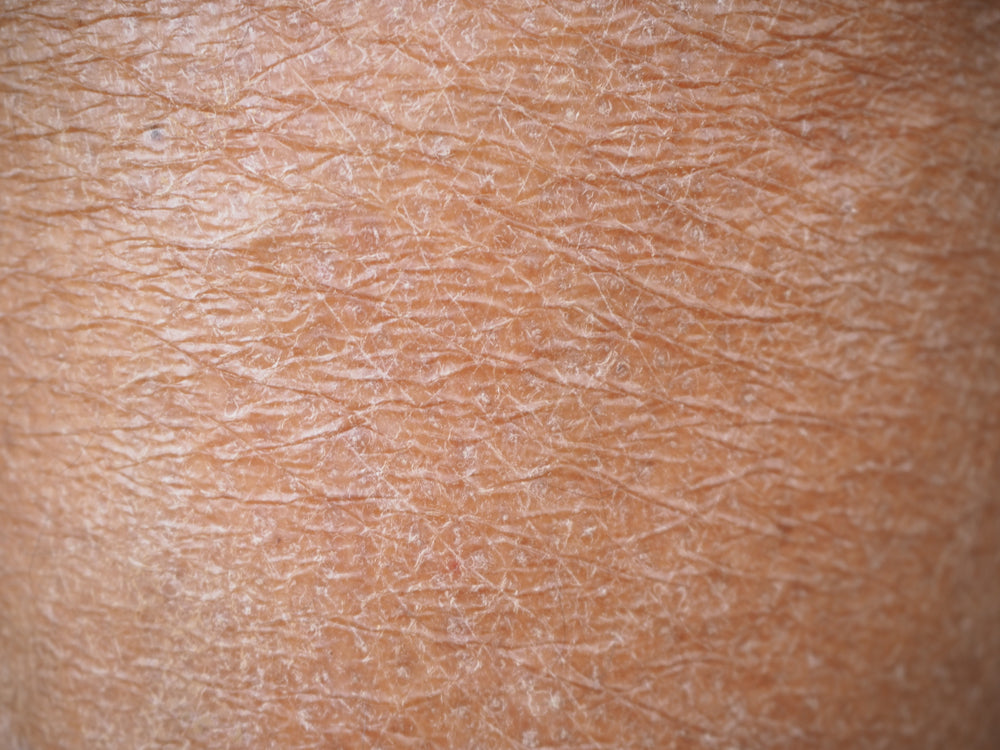Does Dry Skin Cause Acne? Causes & Treatments

There are numerous factors that can contribute to acne. While genetics certainly play a role at the end of the day, it’s also a matter of your diet and health habits. You may also be prone to hormonal changes causing issues.
It’s paramount to assess your skin regularly for any changes and to see a dermatologist if anything worries you. Dry skin and acne can certainly be related, and many acne treatments can dry out your skin in the process.
Fortunately, you can treat one without harming the other, so here’s what to know about how dry skin interacts with zits.
Dry Skin and Acne
For many people, dry skin is harmless. It just means your skin doesn’t produce as much oil as other people.
Sometimes, dry skin is a temporary condition due to the weather outside or other external factors. But some will seemingly have permanent dry skin, making it difficult to take pictures or go outside.
If left untreated, dry skin can result in flaky, itchy skin that may even begin to peel. The first step is to develop a first-class skincare routine that addresses dryness at the source. This should include a high-quality moisturizer that provides your skin with ample hydration.
In the event your skin is still dry, you may need to look into other methods.
What Causes Dry Skin?
Numerous factors can contribute to dry skin, including:
- Aging: As people get older, their skin naturally becomes thinner.
- Heat: Central heating and space heaters can reduce humidity in a room, making you prone to dryness.
- Harsh Soaps and Detergents: Be careful of using soaps, serums, and balms that can make your skin dry, even underneath a beard.
- Medical Treatments: Some people get dry skin after undergoing certain treatments, such as dialysis, or taking certain medications
Can Dry Skin Cause Acne?
Excess oil on the skin contributes to acne. However, dry skin can play a role in this, too. Dryness causes skin to create more oil, which enhances your risk of clogged pores and additional acne.
Additionally, the moisturizer you use to treat dry skin may contribute to the acne. Some moisturizers are too thick, and they clog the pores too tightly. Make sure you use a non-comedogenic moisturizer that’s light on the skin.
How to Treat Dry Skin When You Have Acne
For starters, you should use a gentle cleanser that isn’t too abrasive on the skin. Cetaphil is a good choice and comes recommended by dermatologists for treating dryness without aggravating other problems.
You also want to be careful of how often your cleaning your skin. You generally only need to wash your face once or twice a day. Any more often than that, and you risk overdrying out your pores.
Additionally, if you’re prone to dry skin, then it probably isn’t a good idea to exfoliate. At the very least, you shouldn’t use products that contain alpha hydroxy acids.
Last but not least, if you take acne medication, you should start with a small dose. Some meds have been known to exacerbate dry skin, so start small and see if you need to ramp it up from there.
In the event you use a topical acne treatment, only apply it to the areas with acne as opposed to your entire face. This will prevent any drying substances from getting all over.
Get Rid of Dry Skin Today
Dry skin and acne can be related. It’s also possible for them to have nothing to do with each other. It’s up to you to pay attention to your skin and respond accordingly to any changes.
References:
Hammon, A.M. “If you have both acne and dry skin, then your skincare routine may be to blame — here's how to fix it.” Insider, 11 Dec. 2020. https://www.insider.com/guides/beauty/can-dry-skin-cause-acne
Mayo Clinic Staff. “Dry skin.” MayoClinic, 25 Jan. 2022. https://www.mayoclinic.org/diseases-conditions/dry-skin/diagnosis-treatment/drc-20353891


Leave a Comment